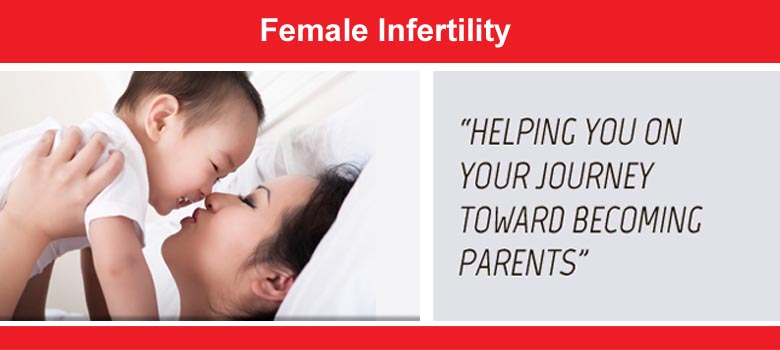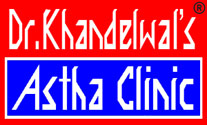
When a woman during reproductive age is unable to conceive after 1 year of unprotected vaginal intercourse, then it is termed as infertility. There can be a number of acquired or genetic conditions that can cause infertility in a woman. The acquired conditions are age, tobacco smoking, sexually transmitted diseases, body weight , eating disorders and chemotherapy. Some sicknesses also can cause infertility.
Female infertility may occur when
- A fertilized egg or embryo does not survive once it attaches to the lining of the womb (uterus)
- The fertilized egg does not attach to the lining of the uterus
- The eggs cannot move from the ovaries to the womb
- The ovaries have problems producing eggs
The most common genetic conditions that may cause infertility are
- Endometriosis
- Polycystic Ovarian Syndrome
- Pituitary Tumors
- Pelvic Inflammatory Disease
- Fallopian tube
Endometriosis
This is a health disorder that affects only women. In this condition, cells from the lining of the womb (uterus) grow in other areas of the body. This may lead to pain, irregular bleeding and problems in conceiving (infertility).
The cells in the uterus are called endometrial cells. These cells are shed each month during menstruation. In Endometriosis these cells attach themselves to tissue outside the uterus and are called Endometriosis implants. These implants are found most commonly on the ovaries, the Fallopian tubes, outer surfaces of the uterus or intestines, and on the surface lining of the pelvic cavity. They can also be found in the vagina, cervix and bladder although less commonly than other locations in the pelvis. In rare cases, Endometriosis implants do occur outside the pelvis, on the liver, in old surgery scars and even in or around the lungs or brain. These implants are benign (not cancerous) while they do cause other problems.
Pain is the main symptom of endometriosis. A woman with endometriosis may also have
- Painful periods.
- Pain in the lower abdomen before and during menstruation.
- Cramps for a week or two before menstruation and during menstruation (cramps may be steady and range from dull to severe).
- Pain during or following sexual intercourse.
- Pain with bowel movements.
- Pelvic or low back pain that may occur at any time during the menstrual cycle.
- Diarrhea and/or constipation.
- Lower back pain.
- Irregular or heavy menstrual bleeding or.
- Blood in the urine.
Homeopathic Treatment of Infertility Associated with Endometriosis
Most women, especially those with mild to moderate endometriosis, will still be able to conceive,. It is estimated that up to 70% of women with mild and moderate Endometriosis will conceive within three to six month with homoeopathic treatment.
Polycystic Ovary Syndrome (PCOS)
A common endocrine disorder that affect 5-10% of women today. The major factors causing PCOS are obesity and complex changes taking place in the hypothalamus, pituitary and ovaries resulting in the over-production of male hormones. Major signs of PCOS are irregular or no periods, excessive growth of hair and infertility i.e. difficulty in conceiving.
Causes of Polycystic Ovarian Syndrome (PCOS)
No one is quite sure what causes PCOS, and it is likely to be the result of a number of both genetic (inherited) as well as environmental factors. Women with PCOS often have a mother or sister with the condition, and researchers are examining the role that genetics or gene mutations might play in its development. Hormonal abnormality in women with PCOS is excessive production of the hormone LH, which is involved in stimulating the ovaries to produce hormones and is released from the pituitary gland in the brain.
Symptoms of PCOS
The principal signs and symptoms of PCOS are related to menstrual disturbances and elevated levels of male hormones (androgens). Menstrual disturbances can include delay of normal menstruation (primary amenorrhea), the occurrence of fewer than normal menstrual periods (oligomenorrhea), or the absence of menstruation for more than three months (secondary amenorrhea). Menstrual cycles may not be associated with ovulation (anovulatory cycles) and may result in heavy bleeding. Generally, the patient presents the following symptoms:
- Irregular menses (usually delayed).
- Weight gain and difficulty in losing weight.
- Acne, oily skin, dandruff.
- Excessive hair growth on the face, chest, back.
- Thinning of hair.
- Infertility.
- Miscarriage.
- High blood pressure.
- Diabetes.
- High cholesterol
Fallopian Tube Damage
Blockage and scarring of the Fallopian tubes, “the passageways for the sperm and egg”, are other common causes of infertility.
A number of conditions can result in tubal scarring or obstruction. The Fallopian tube carries the fertilized egg to the uterus and also is the passage where the sperms meet the egg. Any kind of damage or blockage in the Fallopian tube will make conception difficult. A Fallopian tube could be damaged by inflammation, a previous history of ectopic pregnancy wherein the fertilized egg continues to develop in the Fallopian tube itself or a previous surgery of abdomen or pelvis.
How Is the Cause of Infertility Determined?
If male infertility is suspected, a semen analysis is performed. This test will evaluate the number and health of his sperm. A blood test can also be performed to check his level of testosterone and other male hormones.
If female infertility is suspected, your doctor may order several tests, including:
- A blood test to check hormone levels
- An endometrial biopsy to check the lining of the uterus
Our treatment for Infertility
We have been working hard to provide the best possible and the safest treatment for infertility in women and men, and the good news is we have successfully treated several patients world over having Infertility due to various causes.
Herbal and Homeopathy is scientifically and clinically the best and safest mode of treatment for Infertility, Here we keenly analyze the patients disease history and prepare a personalized treatment plan for the patient.Our treatment approaches towards the management of PCOD is constitutional, taking into account the presenting complaints along with physical, mental and genetic make-up that individualizes a person. Our herbal and homeopathic medicines which acts at the roots can recover deviations of the hormonal system back to normalcy and, in many cases, abolish the need for exogenous hormones with their side-effects and complicating surgical procedures. Moreover, with this hormonal harmony, chances of conception increase significantly.Similarly, other causes of infertility like endometriosis and fallopian tube damage have effective remedies in homeopathic treatment.
Since Infertility can be caused due to various reasons, regular follow ups and counseling are very important for the patients. Our Physicians take utmost care and concern while treating such patients. Don’t feel the setback due to this problem; Astha Clinic is here to set your reproductive life on track.
Herbal and Homeopathy is Highly recommended for Infertility in both Women & Men.

